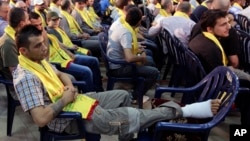BEKAA VALLEY, LEBANON —
Lebanon's Shia Muslim movement Hezbollah is known for its discipline, but the decision to fight in the Syrian civil war has prompted doubts among some supporters.
Enter any Shi'ite town in the Beka'a Valley or in southern Lebanon and you know instantly you're in Hezbollah territory. Hezbollah's yellow flag with the green logo of the Shia party flutters from lampposts and minarets. Photographs of the movement's leader, Sheikh Hassan Nasrallah, are liberally displayed.
So too are an increasing number of photographs of recent Hezbollah "martyrs" - Shi'ite militiamen who have fallen in Syria battling rebels while fighting to save the government of President Bashar al-Assad.
These deaths are prompting some rare behind-the-scenes questioning by Hezbollah families of the wisdom of fighting fellow Muslims, even if they are mainly Sunnis. For them the real enemy is Israel, the foe the movement was founded for in 1982 to confront.
"I have heard many people say, if our son was killed defending south Lebanon against Israeli attack, any attack, we must be very proud but our son was killed in Syria, why?" said retired Lebanese army general Hisham Jaber, a Shi'ite from south Lebanon who has attended funerals of Hezbollah's dead.
Hezbollah has had a major impact on the Syrian civil war since the end of May when Nasrallah declared the movement would redouble its support of Assad.
Nasrallah argued that an end to the Assad regime would serve American and Israeli interests. Shortly after, Hezbollah helped Assad to a major victory by joining the assault on the strategic border town of Qusair, retaking it from Syrian rebels who had held it for more than a year.
One Shi'ite sheikh who declined to be identified said some Hezbollah militiamen sought his counsel on whether they should heed Nasrallah's call to arms.
Among their worries was that by fighting in Syria, Hezbollah would ignite a sectarian civil war in Lebanon. It's a worry shared by many in Lebanon.
"The vast majority of Sunnis in Lebanon don't want to get caught up in a Sunni-Shia civil war and I think the same holds for Hezbollah," said author and commentator Michael Young. "Such a war would be terrible. It would be extremely bloody for, I think, very little advantage for either side."
The Beka'a Valley borders Syria and many families here are related to Syrian Shia Muslims, but Shi'ites in southern Lebanon still harbor reservations about the decision to fight in Syria.
"The family relationship between El Bekka and Syria is different than south Lebanon," said Jaber, the retired general. "People of south Lebanon have nothing to do in Syria."
Many Shi'ite intellectuals are quietly critical. The Shi'ite managing editor of a life-style magazine says she used to respect Hezbollah but now fears its intervention will exacerbate Lebanese divisions and bring the Syrian war to Lebanon.
Enter any Shi'ite town in the Beka'a Valley or in southern Lebanon and you know instantly you're in Hezbollah territory. Hezbollah's yellow flag with the green logo of the Shia party flutters from lampposts and minarets. Photographs of the movement's leader, Sheikh Hassan Nasrallah, are liberally displayed.
So too are an increasing number of photographs of recent Hezbollah "martyrs" - Shi'ite militiamen who have fallen in Syria battling rebels while fighting to save the government of President Bashar al-Assad.
These deaths are prompting some rare behind-the-scenes questioning by Hezbollah families of the wisdom of fighting fellow Muslims, even if they are mainly Sunnis. For them the real enemy is Israel, the foe the movement was founded for in 1982 to confront.
"I have heard many people say, if our son was killed defending south Lebanon against Israeli attack, any attack, we must be very proud but our son was killed in Syria, why?" said retired Lebanese army general Hisham Jaber, a Shi'ite from south Lebanon who has attended funerals of Hezbollah's dead.
Hezbollah has had a major impact on the Syrian civil war since the end of May when Nasrallah declared the movement would redouble its support of Assad.
Nasrallah argued that an end to the Assad regime would serve American and Israeli interests. Shortly after, Hezbollah helped Assad to a major victory by joining the assault on the strategic border town of Qusair, retaking it from Syrian rebels who had held it for more than a year.
One Shi'ite sheikh who declined to be identified said some Hezbollah militiamen sought his counsel on whether they should heed Nasrallah's call to arms.
Among their worries was that by fighting in Syria, Hezbollah would ignite a sectarian civil war in Lebanon. It's a worry shared by many in Lebanon.
"The vast majority of Sunnis in Lebanon don't want to get caught up in a Sunni-Shia civil war and I think the same holds for Hezbollah," said author and commentator Michael Young. "Such a war would be terrible. It would be extremely bloody for, I think, very little advantage for either side."
The Beka'a Valley borders Syria and many families here are related to Syrian Shia Muslims, but Shi'ites in southern Lebanon still harbor reservations about the decision to fight in Syria.
"The family relationship between El Bekka and Syria is different than south Lebanon," said Jaber, the retired general. "People of south Lebanon have nothing to do in Syria."
Many Shi'ite intellectuals are quietly critical. The Shi'ite managing editor of a life-style magazine says she used to respect Hezbollah but now fears its intervention will exacerbate Lebanese divisions and bring the Syrian war to Lebanon.




